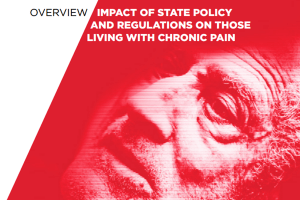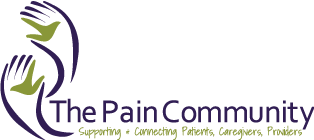
Pain is one of the most devastating public health problems affecting Americans today. In 2011, the Institute of Medicine (IOM) published Relieving Pain in America: a Blueprint for Transforming Prevention, Care, Education and Research, articulating the magnitude of this issue. Not including children, veterans and those who are institutionalized, the IOM reported that at least 100 million adults are affected by pain at a cost of $560-635 billion dollars annually, including medical expenses and lost wages.
 Pain affects employers, who bear the burden of lost productivity due to “presenteeism,” i.e., workers who show up for income and health insurance benefits, but are distracted by so much pain that they are unable to fulfill their duties. Pain affects all of us: children who miss school, parents who cannot participate in their children’s lives; employees who cannot fully contribute and employers who count on them. And, pain affects communities, siphoning away its citizens to a world of isolation.
Pain affects employers, who bear the burden of lost productivity due to “presenteeism,” i.e., workers who show up for income and health insurance benefits, but are distracted by so much pain that they are unable to fulfill their duties. Pain affects all of us: children who miss school, parents who cannot participate in their children’s lives; employees who cannot fully contribute and employers who count on them. And, pain affects communities, siphoning away its citizens to a world of isolation.
Pain is not sensational, front-page news. However, pain will affect us all at one time or another during our life’s journey. For some, it will be a mild and brief encounter; for others, it will be years of agony. Those living with chronic pain don’t march on Washington or their state capitol. Their energy and efforts are focused on activities of daily living that many of us take for granted. Some, who have found effective ways to manage their pain, however, have taken up the mantle of advocacy. But, for many, pain remains a silent and isolating epidemic. State legislators and regulators play an important role in promoting appropriate care for those who struggle to live with unrelenting pain.
Chronic pain often causes suffering and misery that diminishes the quality of one’s life, the will to live, and even life itself. To address the challenge of this public health issue, an alliance has formed to advance the IOM report recommendations that will truly transform pain care in America. The Pain Action Alliance to Implement a National Strategy (PAINS) is a national alliance of professional societies, consumer advocacy organizations, and others who believe there is a moral imperative to improve the treatment of pain.
Members of PAINS believe that policymakers and others formally tasked with the responsibility to make public policy decisions need current information about the management of pain and the effect that their decisions can have on people who live with pain and the providers who care for them. PAINS will support policy makers by publishing a series of policy briefs and hosting a peer-reviewed website to provide policy makers and others with well researched, objective information and access to expert views on complex matters.
| Website | http://painsproject.org |
|---|---|
| Author(s) | Christopher, Myra - Steering Committee Chair and members of the PAINS Project committee |
| Attribution | Courtesy of PAINS Project |
| Document | Download PDF |
